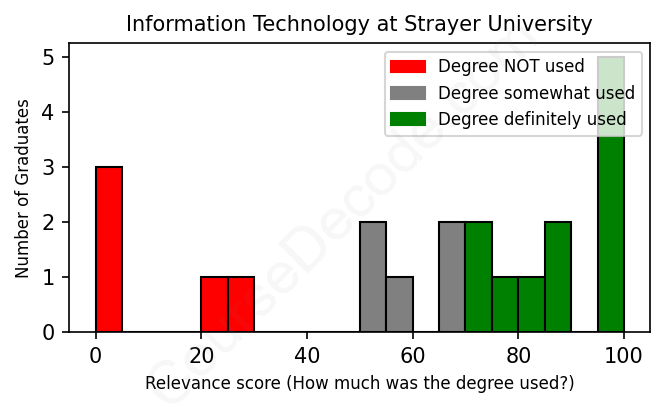
First, some facts. Of the Information Technology graduates from Strayer University we've analyzed , here's how many have used (or NOT used) their degree in their career:

These are estimates based on AI analysis of 21 LinkedIn profiles (see below).
The verdict? Slightly below average. Overall, with an average relevance score of 62%, Information Technology graduates from Strayer University have a slightly lower likelihood (-5%) of finding work in this field compared to the average graduate across all fields:
And for comparison, here's the chart for all profiles we've looked at across all degrees.
Also, after graduating, only 23% of these graduates have pursued further education other than another Bachelor's degree (such as a Masters degree or other), compared to the average across all profiles of 35%. This suggests a Bachelors degree is enough for most Information Technology graduates, and it's normal to look for work straight after graduation.
See the details:
|
Relevance score: 85% We think this person has gone into a career highly relevant to their degree. We think this person has gone into a career highly relevant to their degree.
DEGREE INFOGraduated in 2010 from Strayer University with a Bachelor of Science - BS in Information Technology. No other secondary education since. JOB HISTORY SINCE GRADUATIONQA Analyst AmeriHealth Caritas Jan 2014 - Dec 2016 QA Automation Engineer  CNA Insurance Feb 2017 - Jun 2020 Senior QA Automation Engineer  Wells Fargo Jul 2020 - Present ABOUTQA Automation Engineer, renowned for revolutionizing testing frameworks and methodologies in high-profile environments. At Wells Fargo, architected and enhanced Cypress and Selenium WebDriver frameworks, elevating testing efficiency by 4%. Spearheaded Angular 2 application testing, integrating Jasmine and Protractor, and innovated in REST API testing, achieving a 9% increase in backend testing speed. At CNA Insurance, engineered a BDD API automation framework, reducing script development time by 10%, and improved SOAP & RESTful Web Services testing efficiency by 11%. At AmeriHealth, deployed a Selenium WebDriver-based framework, cutting execution time by 9%. Expert in Agile methodologies, cloud testing, and cross-browser initiatives, consistently delivering high accuracy and reducing post-deployment issues. Proven leader in fast-paced, technology-driven environments. |
The top 10 most common jobs done by the graduates we've analyzed (ranked most common to least) are:
When looking at the job paths of people who graduated from Strayer University with a degree in Information Technology, you can see that there’s a mix of roles. A lot of them have found opportunities as Quality Assurance Analysts and Automation Engineers, which are definitely relevant to IT since they involve software testing and improving how software products perform. Other common roles include Web Developers and Database Administrators—both of which require solid technical skills and align closely with what one would learn in an Information Technology program. You’ll also find positions like Systems Administrators and Support Technicians, where hands-on technical skills are crucial to keeping computer systems up and running.
However, not all jobs these graduates have taken are directly aligned with their IT education. Some have ended up in roles that are more customer service-focused or managerial, like Customer Service Managers and Campus Coordinators, which don’t really leverage the technical aspects of their degree. There are also quite a few who ventured into roles that aren’t tech-heavy at all, like Warehouse Associates or even caretaking, which completely stray from IT. Overall, while many graduates landed jobs that utilize their IT skills, there’s a notable number that have taken on positions where their degree isn’t really applied. So, it's a mixed bag—you can definitely find IT-related roles, but there are also many paths that don’t directly use those technical skills learned in college.
Here is a visual representation of the most common words in job titles for Information Technology graduates (this is across all Information Technology graduates we've analyzed, not just those who went to Strayer University):

When you check out the career paths of graduates from Strayer University with a degree in Information Technology, you see a pretty promising landscape. Many of them kick off their careers in positions like QA Analysts, Technical Support Specialists, or various roles in web and software development right after graduation. For example, a bunch of grads from 2012 began their journeys as support technicians or web developers. Over time, lots of these individuals climbed the ladder, moving into senior or lead roles in quality assurance, software development, or system administration just a few years later. That's a solid indicator that these folks are finding their footing in the IT world and building valuable skills along the way.
Fast forward 5 to 10 years, and it looks like Strayer graduates are still heavily involved in relevant IT roles. Many have transitioned to senior positions or specialized roles, like Senior QA Automation Engineers or Lead Software Developers, which showcases their growth and adaptability in a fast-paced industry. However, it's important to note that not everyone followed an upward trajectory; there are a few graduates who found themselves in less relevant positions, like those working at retail jobs after graduation. But on the whole, the majority of people seem to be doing well and are definitely carving out solid pathways in tech fields that are more aligned with their degrees. So if you’re thinking of going down this road, it looks pretty promising overall!
Honestly, getting a Bachelor’s degree in Information Technology can definitely be manageable, especially at a school like Strayer University, which focuses on adult learners and working professionals. The coursework can range from basic tech skills to more complex topics like networking and cybersecurity, but a lot of it is designed to be practical and relatable, so you often get hands-on experience. If you're someone who's tech-savvy or just genuinely interested in the field, you might find it easier than other subjects, but like any degree, it’ll still require dedication and some late-night study sessions. Overall, it's about average in difficulty, so as long as you keep up with the material and engage with your studies, you can totally handle it!
Most commonly, in the LinkedIn profiles we've looked at, it takes people 4 years to finish a Bachelor degree in Information Technology.
So, looking at these Strayer University grads, it seems like most of them have made some decent money, especially those working in tech roles like QA, software development, and database administration. For instance, the folks who've climbed up to senior or lead positions are likely raking in a good salary—think six figures here. On the flip side, there are others who have bounced around a bit more or had roles like support tech or warehouse jobs, which usually pay less. Overall, if you’re planning to pursue a tech degree, it’s a solid path with the potential for a pretty good paycheck down the line, just depends on the job title and experience level!
Here is a visual representation of the most common words seen in the "about" section of LinkedIn profiles who have a Bachelor degree in Information Technology (this is across all Information Technology graduates we've analyzed, not just those who went to Strayer University). This may or may not be useful:

Here are all colleges offering a Bachelor degree in Information Technology (ordered by the average relevance score of their Information Technology graduates, best to worst) where we have analyzed at least 10 of their graduates: